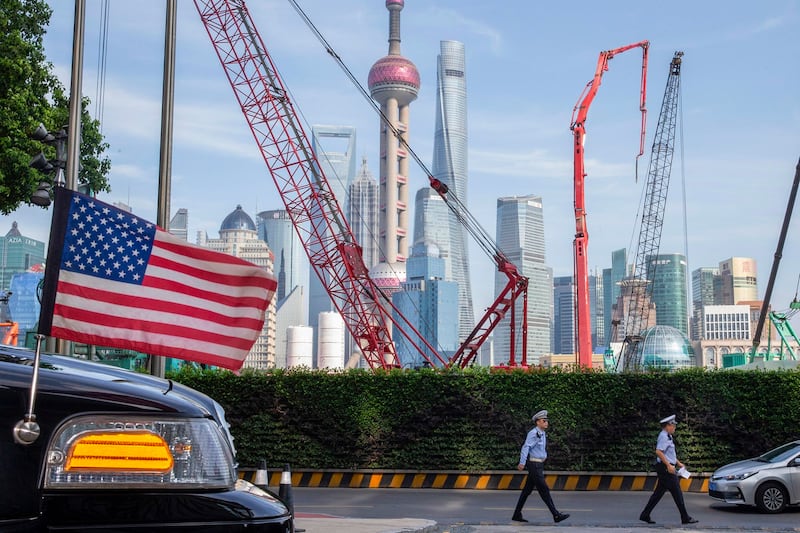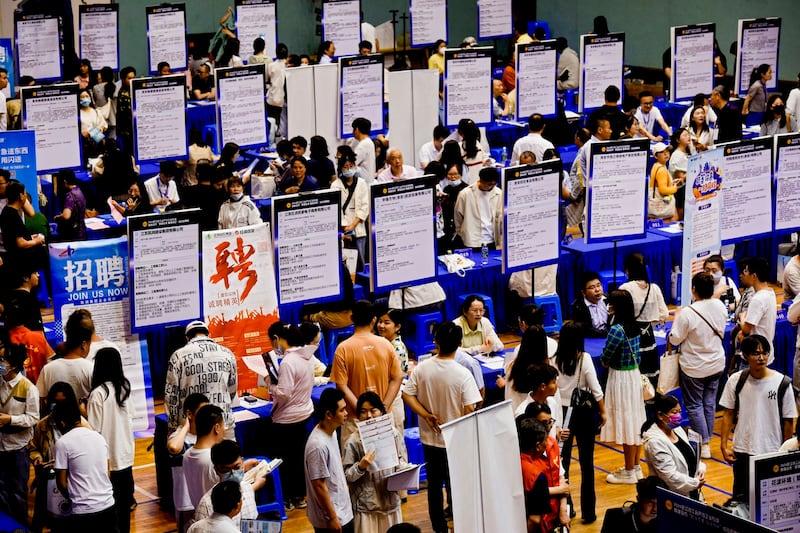Formerly prosperous workers in China, both white-collar and blue, are struggling with the hard reality of unemployment, interviewees told RFA Mandarin ahead of a major economic policy meeting the government claims will bring a brighter future.
The tales of hardship contrast with the upbeat tone of commentaries about economic measures to be announced at the Chinese Communist Party's third plenum on July 15 that will supposedly make all the difference.
"Entering July, Chinese people's expectations will be running high," according to a June 30 commentary in the Global Times newspaper, trumpeting "a holistic package of new reform plans" that is expected from the meeting.
"After more than 40 years' reform and opening-up, Chinese policymakers are becoming both astute and experienced in managing a giant economy like China's," it said.
But former employees who took out mortgages and started families during the boom-time before the COVID-19 pandemic struck in early 2020 tell a very different story in recent interviews with Radio Free Asia.
An IT professional from a major Chinese city who gave only the pseudonym Chen and limited professional details for fear of reprisals said he lost his highly paid job at a U.S. company "a few years ago," after the company was dropped from the supply chain of Chinese manufacturers due to increasingly strict quotas about the use of foreign technology imposed by both sides in the Sino-U.S. trade war.
Undeterred, Chen found himself another job at a European startup, only to be laid off when that company divested from China entirely.
'Few opportunities'
Chen now calls himself a freelance consultant, and occasionally gets small work-for-hire jobs and corporate consulting gigs.
But he's essentially unemployed, along with many of his skilled, white-collar peers.

"Last week, when I got together with some former colleagues, I heard that a lot of people have lost their jobs," he said, adding that jobs in foreign-owned companies are pretty scarce these days.
"A lot of my former friends and colleagues have either gone to work in state-owned or private companies, or joint ventures," Chen said. "Sometimes, when foreign companies pull out, they don't want to totally give up on this market, so they form a joint venture with a Chinese company and keep some business activity going."
One friend couldn't take the shift in corporate culture from a U.S.-owned company to a Chinese state-owned enterprise, however, and quit after just a year, Chen said.
"You'd think it would be enviable to land a job in such a big company, but he quit after less than a year because he couldn't adapt -- the culture shock was too big," he said.
The life of an IT consultant has been a bit of a comedown for Chen, and he has little recourse to that other generator of middle-class wealth, investments.
"There is less and less to invest in in China, and not many channels open," he said, citing the stock market crash earlier this year and collapse of a slew of asset management companies amid the economic downtown. "And a lot of them are scams."

"There are few job opportunities and few opportunities to grow your wealth," he said. "Yet there are plenty of opportunities, or traps, for taking your wealth away."
"Actually, it's best to not do anything at all."
Changing dynamics
A former asset management company employee from Shanghai who gave only the pseudonym Liu for fear of reprisals lost his job when the company went bankrupt.
Then the city was thrown into COVID-19 lockdown in 2022. Liu eventually found another job at a listed automobile parts company supplying American and European manufacturers, but was let go from there too.
"General Motors, Ford and other manufacturers are required to ensure that the proportion of parts made in China must be reduced to 45% within the next three years," Liu told RFA Mandarin.
The company took its production capacity to Thailand instead.
"The transfer of production capacity overseas will inevitably mean insufficient production at home, it's that simple," Liu said.

Liu, who is 39, has been unemployed ever since. He said his age is now strongly against him, yet he has a child and elderly parents depending on him.
"The companies that I like or that can afford my salary are all in a poor financial state," he said. "Also, there's this trend, I don't know when it started, that now that nobody is hiring people over 35. It's actually true."
And it's hard to get back into the Chinese state sector if you don't already have contacts there.
Competition for existing jobs is intense, and six-day weeks are now the norm.
China is also bursting at the seams with young, highly qualified graduates, offering masters and PhDs, Liu said.
Yet Liu's 600,000 yuan (US$82,500) mortgage isn't going to pay itself.
"I force myself to go out every day," he said. "I don't wear a suit and tie, but I wear professional clothes, and meet up with various people and see if there's any sign of a breakthrough."
"I feel like I will just rot if I sit at home."
Feeling the pinch
Blue-collar workers are feeling the pinch too.
A former construction worker in his 20s from the southern city of Changsha who gave only the pseudonym Sun for fear of reprisals said he has been unemployed for two years now, although he prefers to describe himself as "waiting for work."
Sun's job once brought in a good salary of up to 8,000 yuan (US$1,100) a month, but his boss closed the company down in 2022 in the economic downturn that came after the ending of COVID-19 restrictions that year. A few months later, the entire real estate sector was in freefall.

At least Sun wasn't caught out like many borrowers, paying mortgages on unfinished properties they couldn't even live in.
But while he has only paid off some of the loan, he is reluctant to struggle to earn a few cents in China's gig economy, which now accounts for 27% of the country's labor force, with 200 million people registered as being in "flexible employment."
"Some former colleagues from our sector are now driving for [ride-sharing app] Didi, or delivering food, but it's very high pressure because more and more people are doing it, and everyone is unemployed," Sun said.
He cites poor, often hazardous, working conditions, pointing to a recent report of a food delivery rider in Changsha who narrowly escaped a flash flood with his life in a recent rainstorm, and had to be rescued by police.
"It's totally unnecessary for me to risk my life just to make 5 or 6 yuan (70-80 U.S. cents) per delivery," he said.
Sun's family is currently getting by on his wife's salary as a nurse. His elderly parents are paying off his mortgage while he has no income.
He can't see things improving anytime soon.
"I feel that the economic growth we had in the past was too fast, and that we'll be paying back the overdraft on the economy for the next 20 years, or even longer," he said, adding that he is seeking solace and support from others in his situation on social media.
"I feel like I can't see a future," he said.
Translated by Luisetta Mudie. Edited by Malcolm Foster.
